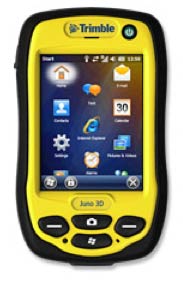On Febrary 8, 2012, Trimble introduced a new generation of its "GNSS" devices for GIS field applications, the Trimble Juno 3B and 3D handhelds.
 Trimble has a long history of offering Pocket PCs and PDAs with built-in GPS, but in early models GPS was often poorly integrated. That changed with the Trimble Juno SA/SB/SC/SD models that were built from the ground up to be GIS data collection systems, and remain available for now (February 2012).
Trimble has a long history of offering Pocket PCs and PDAs with built-in GPS, but in early models GPS was often poorly integrated. That changed with the Trimble Juno SA/SB/SC/SD models that were built from the ground up to be GIS data collection systems, and remain available for now (February 2012).
These latest two devices—one with and one without 3.75G wireless—represent a complete re-design of the series, one with the goal of making the devices tougher and faster in addition to the inclusion of the usual tech updates between models.
While Trimble doesn't specify the specific processor of the new models, it does list the clock speed, and that is up to 800MHz (from 533MHz in the predecessor models). RAM and ROM got big boosts as well, with RAM doubling to 256MB and Flash going from just 128MB all the way to 2GB. The operating system is no longer Windows Mobile 6.1 but the somewhat more modern Windows Embedded Handheld 6.5. The microSDHC card slot is still there, but the old 3-megapixel camera with auto focus has given way to a 5-mp model.
What hasn't changed is the size and resolution of the 3.5-inch QVGA 240 x 320 pixel sunlight-readable touch screen. With GPS and GIS applications, more resolution is always better, but Trimble probably had its reasons for staying with the lower res. Also unchanged are the Bluetooth, 2.0 and 802.11b/g wireless LAN radios, but mobile broadband is now up to HSPA+ 3.75G cellular. GPS specs look the same: a 12 channel high-sensitivity GPS/SBAS receiver and antenna that support the NMEA and SiRF protocols and can deliver code post-processed accuracy between three and ten feet.
As before, the new Junos' GPS receiver was specifically designed to maximize position yields in challenging GPS environments, such as under forest canopy and near buildings in urban areas. Both can achieve real-time SBAS (satellite-based augmentation system) accuracy of 2 to 5 meters after differential correction or in real-time with Satellite Based Augmentation Systems (SBAS) such as the U.S. Wide Area Augmentation System (WAAS), European Geostationary Navigation Overlay System (EGNOS), and Japan's Multi-Functional Satellite Augmentation System (MSAS).
Like many Trimble products, the new Junos are bright-yellow. They are also ergonomically designed and fairly compact (3.1 x 5.4 x 1.2 inches), though a bit larger and heavier (10.8 ounces) again than earlier Junos. The new Juno Series differentiates between the 3B (basic) and 3D (all tricked out) models, where the 3D model comes with cellular voice & data, a camera with a flash, Microsoft Office Mobile software and other goodies. There is also a large selection of optional software, ranging from TrimPix Pro for wireless camera support, GPS Controller software for controlling NMEA output and in-field mission planning, TerraSync, the Trimble GPScorrect extension for ESRI's ArcPad and GPS Analyst extension for ESRI's ArcGIS, GPS Pathfinder Office software and a SDK for it.
While any Trimble handheld has always been well-made and durable, the new Junos are a good step up in terms of ruggedness. Operating temperature range has widened to -4 to 140 degrees Fahrenheit, the drop spec is up to four feet, tumble drops have double to 100 0.5 meter cycles and the entire device has a tougher look and feel.
Overall, the new Juno models from Trimble can be used as rugged voice/data handheds replacing consumer smartphones in the field, or as part of a fully integrated, GPS-based data collection system in conjucntion with other Trimble GIS-based components.



